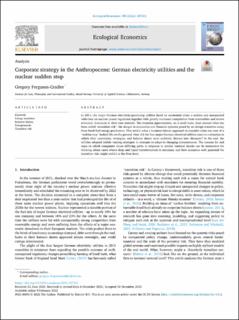Corporate strategy in the Anthropocene: German electricity utilities and the nuclear sudden stop
Peer reviewed, Journal article
Published version
Permanent lenke
https://hdl.handle.net/11250/3059567Utgivelsesdato
2022Metadata
Vis full innførselSamlinger
Sammendrag
In 2011, the major German electricity-producing utilities faced an existential crisis: a sudden and unexpected volte-face on nuclear power regulation together with greatly increased competition from renewables and severe economic downturn in their core markets. The situation approximates, on a small scale, fears around what has been called “transition risk”: the danger to economies and financial systems posed by an abrupt transition away from fossil fuel energy production. This article takes a business history approach to consider what one case of a “sudden stop” looked like on the ground. How did the four major German electrical utilities react to a situation in which their operations, strategies, and balance sheets were suddenly thrown into disrepair? In the end, the utilities adopted widely varying strategies in attempts to adapt to changing circumstances. The reasons for and ways in which companies chose differing paths in response to similar external shocks can be instructive for thinking about cases where deep and rapid transformation is necessary and how scenarios with potential for transition risk might unfold at the firm level.

